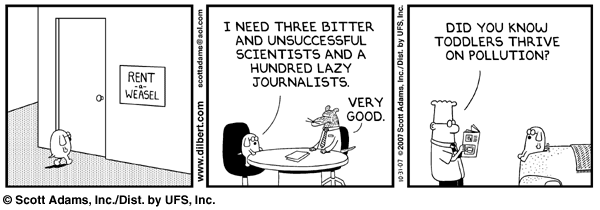October 31, 2007
The psychodynamics of science in the media
This morning's Dilbert advances a theory about why the coverage of science in the mass media is so bad.

But I think it's wrong to pin the blame on personality defects and moral flaws in individual scientists and journalists. Nor should we over-emphasize the malign influence of the Dogberts who run the show, and the Rent-a-Weasels who support them. (And while we're cataloguing defects and flaws, let's not forget the crucial role of the folks in the public relations departments, who select topics and write the press releases that seed most science stories. But the flacks are not really the villains here either.)
It's true that things would be better if individual scientists were less willing to over-interpret or mis-interpret in order to make a splash; and if PR people were less eager to encourage and help them; and if individual journalists had the time and the ability to do some critical reading in the primary literature, instead of just decorating press releases with a few quick quotes from experts; and if media executives were not too focused on bean-counting to care one way or another about any of this. But focusing on individual failings ignores the fact that all of the people involved -- scientists and journalists and executives and rent-a-weasels -- are responding to the normal economic and psychological forces within their diverse subcultures, which interact badly in their areas of overlap.
On the whole, the whole system of science and engineering does a pretty good job of creating knowledge and technology. On the whole, the media do a pretty good job making information available to the public. Put them together, and the whole is noticeably less responsible than the parts.
In fact, the subcultures of science and journalism are so ill-matched that it's amazing we don't get a steady diet of stories about imaginary studies, non-existent animals with superpowers, alarmist fantasies, misleading or fabricated numbers, and so on.
Oh, wait...
Anyhow, individual virtue is always to be prized. But if you want better science journalism, you need to change the cultural and economic forces that gives us the system we have.
Better education, especially in statistics -- for the audience as well the creators of the stories -- is probably the one thing that would make the biggest difference. And commentary in the "new media" -- especially weblogs -- adds another cultural force whose influence is mostly positive.
Posted by Mark Liberman at October 31, 2007 06:51 AM